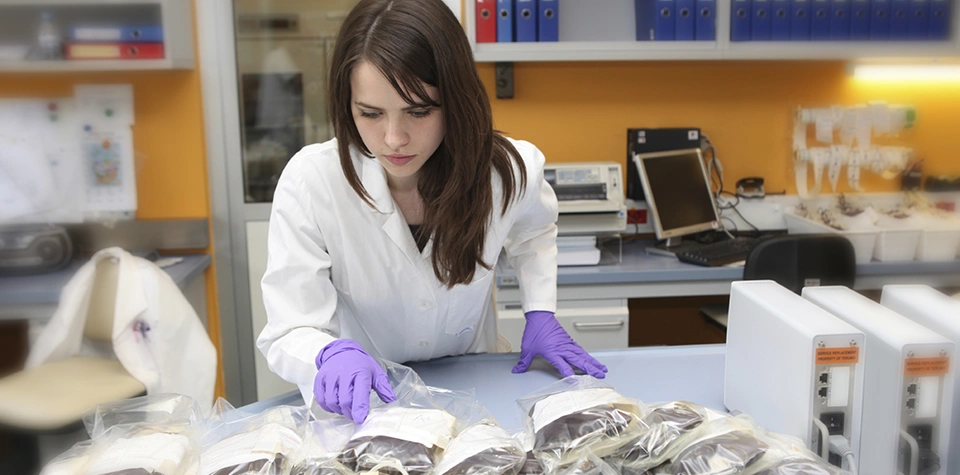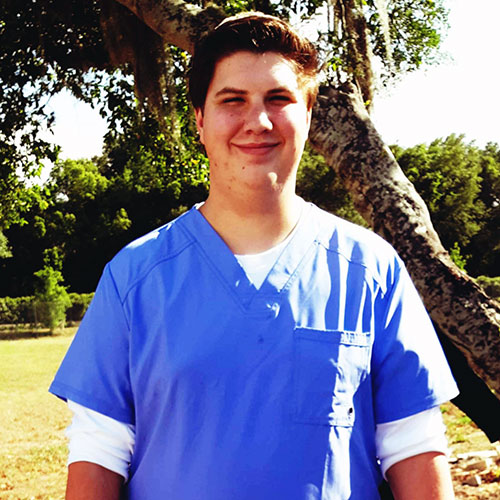Phlebotomy Technician Program
Diploma/Certificate in Phlebotomy Technician
Become a Phlebotomy Technician With Cambridge

Want to enter the field of phlebotomy? Cambridge’s Phlebotomy program gives you the training you need for a successful career as a phlebotomy technician. The program only takes 11 weeks to complete. Once you’re finished, you’ll receive your Phlebotomy Technician Certificate.
What Is a Phlebotomy Technician?
A phlebotomy technician is a critical member of the patient care team. They support doctors, nurses and other medical professionals during the diagnostic process. Key responsibilities include drawing and testing blood samples, evaluating patients during visits, performing venipunctures, preparing bodily fluids for testing and more.
Learn More About the Atlanta Phlebotomy Technician CampusLearn More About the Miami Phlebotomy Technician CampusLearn More About the Orlando Phlebotomy Technician CampusLearn More About the Palm Beach Phlebotomy Technician Campus
Phlebotomy Technician Curriculum
The Phlebotomy Technician program features an in-depth curriculum that covers everything you need for success. You’ll learn how to draw blood, how to prepare samples for testing, how to assist patients during draws and so much more. Using our state-of-the-art facility, you’ll also receive hands-on training.
Phlebotomy Technician Diploma Courses
- Health Science Core
- Principles and Practice of Phlebotomy
Job Outlook
The outlook for the Phlebotomy Technician field is positive, according to the U.S. Department of Labor—experts predict that the field will continue to grow by more than 20 percent in the coming years. Due in large part to advances in healthcare technology and longer life expectancies among the population, the growth offers opportunities for qualified candidates in Florida and throughout the United States.
Phlebotomy Technicians are valued members of many medical care teams, including in hospitals, blood donation centers, testing facilities, medical clinics and more.
Careers
Phlebotomy Technician Work Environments
Phlebotomy technicians work anywhere lab work is required. This may include hospitals, clinics, long-term care facilities, doctor’s offices, specialty labs and outpatient care centers.
What Is the Job Outlook for Phlebotomy Technicians?
Phlebotomy technicians are in high demand across the country. According to the Bureau of Labor Statistics, the phlebotomy technician career is expected to grow by 22% between now and 2030 which is much faster than average growth for all other occupations.
Phlebotomy Technician Salary
The Bureau of Labor Statistics states that the average salary for a phlebotomy technician is $36,320 per year or $17.46 per hour. Remember, this number could be higher or lower depending on your local job market, employer and other factors.
Why Choose Cambridge?
Many colleges and universities across the country offer phlebotomy programs. However, many students choose Cambridge for the many benefits we offer such as:
- Hands-on training: You’ll get to learn and practice new skills in a real-world work environment. From drawing blood to preparing lab samples, you’ll perform these tasks through hands-on training, ensuring you walk away ready for the field.
- Supportive faculty: Our faculty and staff are here to help you succeed. Whether you need study assistance or have questions, we’re always here to help.
- Job placement services: At the end of your program, you’ll have access to our job placement services. We partner with many regional care facilities to place qualified students into open positions.
Degree
Upon successful completion of this program, students receive a diploma/certificate in Phlebotomy Technician
Program Summary
- Phlebotomy Technician Diploma/Certificate
- 11-week course
- Focused curriculum
Program Location(s)
- Altamonte Springs Campus – Orlando, Florida Area
- Atlanta-area Campus – Atlanta, Georgia Area
- Delray Beach Campus – West Palm Beach, Florida Area
- Miami Campus – Miami Gardens, Florida Area
FAQs About Our Phlebotomy Technician Program
What Does a Phlebotomy Technician Do?
Phlebotomy technicians spend their days drawing blood and preparing bodily fluids for testing. These tests will help doctors and other medical professionals diagnose specific medical conditions. These technicians also work to keep patients calm during draws and they maintain lab equipment.
How Do I Become a Phlebotomy Technician?
To become a phlebotomy technician, you’ll first need to attend an accredited phlebotomy program such as the one offered through Cambridge. This program takes approximately 11 weeks to complete.
After graduation, you’ll need to take and pass the National Healthcare Association (NHA) exam to seek employment. Once passed, you’ll be licensed as a phlebotomist and eligible for entry-level work.
Is the Phlebotomy Technician Career a Good One for Me?
Phlebotomy is a great career for those interested in healthcare and who want to start their new careers fast. However, it’s important to note that your days will be spent dealing with blood and other fluids. If this isn’t something you’re comfortable with, you may consider other career options.
Phlebotomy Technician Program FAQ
Start Your Phlebotomy Career With Cambridge
Ready to start your phlebotomy career? If so, we’re ready to help. To learn more about our program or to apply today, give us a call at 877-206-4279 or send us a message.
Recent Phlebotomy News & Articles
 Work Environment for Phlebotomy Technicians
Work Environment for Phlebotomy TechniciansPhlebotomy technician jobs are almost always in high demand and will continue to be important due to the increasing medical needs of an aging population. Phlebotomy technicians play an important role that combines skill, care, and versatility, making it an exciting path for anyone. This article will outline everything you need to know about phlebotomy technician jobs so you can decide if it’s the right occupation for you to pursue. Where do Phlebotomy Technicians Work? While a high percentage of phlebotomy technicians work in state, local and private hospitals and diagnostic or medical laboratories you may also find them employed in… Read more »
 Phlebotomy Technician Guide to Career Success
Phlebotomy Technician Guide to Career SuccessIn the bustling healthcare industry, phlebotomy technicians play a crucial role in ensuring accurate diagnosis and treatment by expertly drawing blood samples for testing and transfusions. If you are considering a career as a phlebotomy technician in Atlanta, you are stepping into a field that offers rewarding opportunities and steady demand. Here is a comprehensive guide on how to kickstart your journey. Securing Phlebotomy Technician Jobs Getting a job as a phlebotomy technician typically requires a blend of education, hands-on training, and certification. Begin by obtaining a high school diploma or equivalent. While not always mandatory, it’s a standard requirement… Read more »
 What Are the Need to Knows for Phlebotomy
What Are the Need to Knows for PhlebotomyPhlebotomy, a vital aspect of healthcare involving patient blood samples, is crucial in diagnostic procedures and medical research. Aspiring phlebotomists often have questions regarding their training, expectations from the program, the nature of the phlebotomy test, and potential employment opportunities. We’ll explore these essential aspects of phlebotomy to provide you with a comprehensive understanding. How Long is Phlebotomy School? The duration of phlebotomy school can vary depending on the educational institution and program type. Cambridge College of Healthcare & Technology offers an exceptional phlebotomy program. This comprehensive curriculum ensures that you receive in-depth instruction on anatomy and physiology, venipuncture techniques,… Read more »






